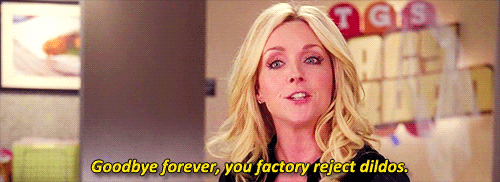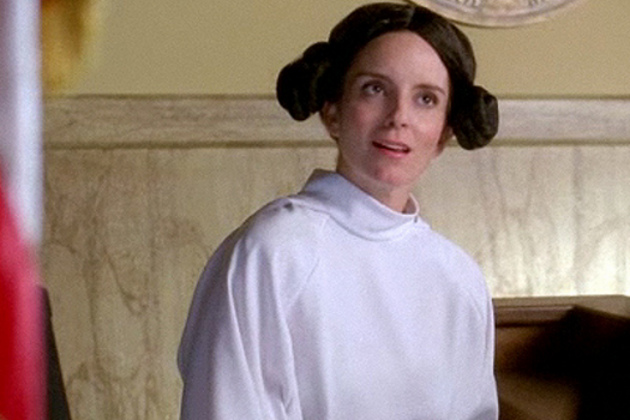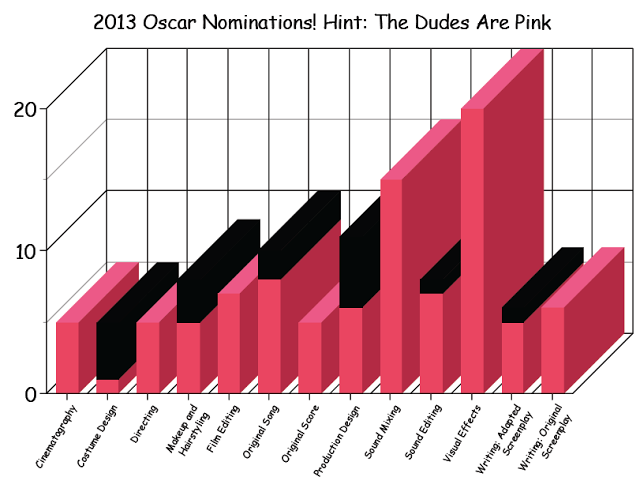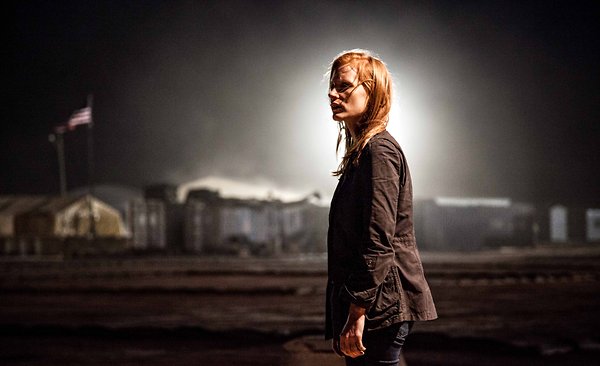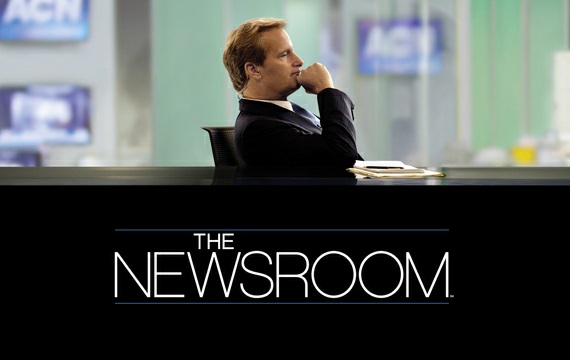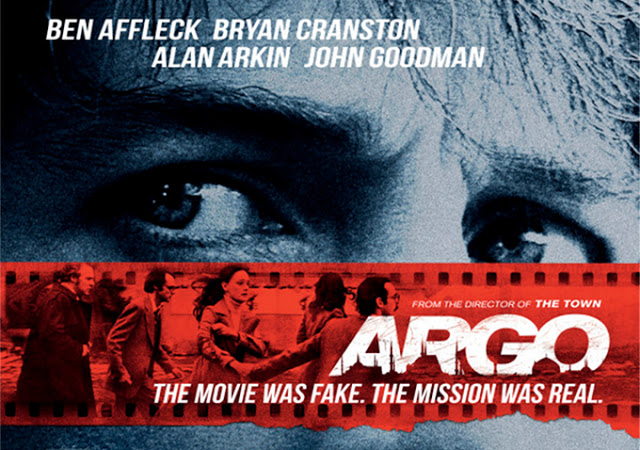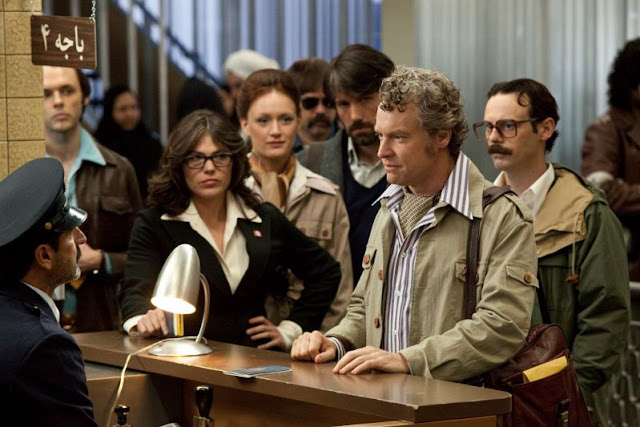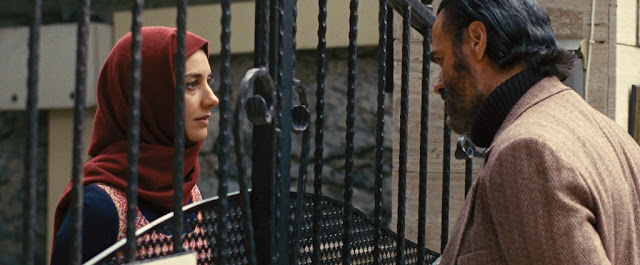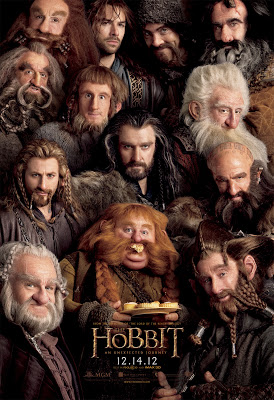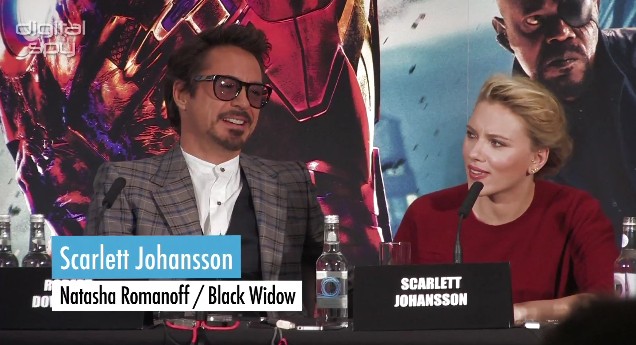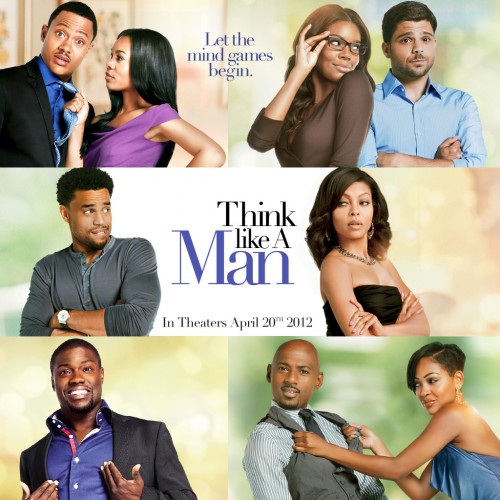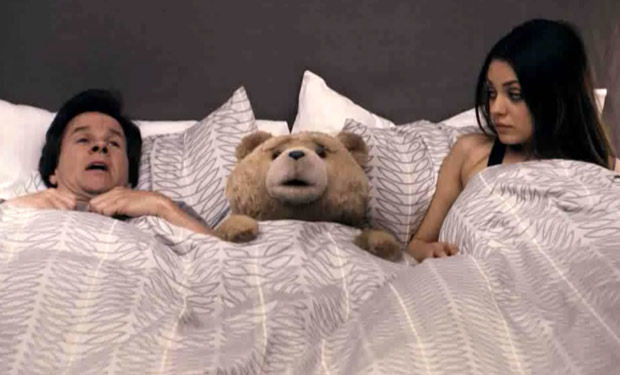I have never considered Liz Lemon a feminist icon of any kind, nor have I ever considered 30 Rock especially strong when it comes to gender politics.I don’t care for the obsessive joke-making about how Liz is ugly/mannish/old/awkward, and I haven’t always been comfortable with the way some of the “she’s baby-crazy!” or “she’s relationship-crazy!” comedy has played. …And yet, I think it’s been one of the most important, helpful, meaningful, landscape-altering shows for women in the history of television.
Tag: Sexism
Bitch Flicks’ Weekly Picks
Did We Have a Pro-Woman Golden Globes? by Renee Martin via Womanist Musings
A Salute to Girl Power in Hollywood by Alessandra Stanley via New York Times
Jodie Foster Coming Out: “This Is Something for Us” by Haviland Stillwell via AutoStraddle
New York Times Says “Female Directors Gain Ground Slowly.” Should We Wait That Long? by Melissa Silverstein via Women and Hollywood
Denzel and Quvenzhane Are the Only Actors of Color Nominated for Oscars by Jorge Rivas via ColorLines
Oscar and the Film Industry: Still a Men’s Club by Rachel Kassenbrock via Ms. Magazine
Kathryn Bigelow Oscar Snub: Does the Academy Hate Female Directors? by Christopher Zara via International Business Times
Parenthood Bravely Tackles Abortion by Willa Paskin via Salon
Why Girls Still Matters in Season 2 by Karensa Cadenas via Women and Hollywood
From M to Hushpuppy: The Best Flawed Female Characters of 2012 by Alyssa Rosenberg via The XX Factor
The Hobbit: Why Are There No Women in Tolkien’s World? by Ruth Davis Konigsberg via Time
Totally Rational Prediction: Women Will Rule Cable TV in 2013 by Alyssa Rosenberg via The XX Factor
Natalie Portman and Kristen Stewart Top Forbes’ List of Most Bankable Actors by Rebecca Pahle via The Mary Sue
The Hobbit: A Gender-Bending Journey by Natalie Wilson via Ms. Magazine
Teen Motherhood: When “Reality TV” Doesn’t Fully Reflect Reality by Avital Norman Nathman via RH Reality Check
Please share what you’ve been reading or writing this week in the comments!
This Needs No Explanation
2013 Golden Globes Week: ‘Zero Dark Thirty’ Raises Questions On Gender and Torture, Gives No Easy Answers
 |
| Jessica Chastain as Maya in Zero Dark Thirty |
Written by Megan Kearns. | Warning: Spoilers ahead!!
Driven, relentless, bad-ass women in film always hold a special place in my heart. Ripley from Alien and Aliens, Patty Hewes from Damages, Carrie Mathison from Homeland. Maya, the female protagonist of Zero Dark Thirty, is no exception. But can a film be feminist if it depicts horrific violations of human rights?
As Candice Frederick asserts, Maya anchors and propels the film. With a woman at the center of this story, it’s hard not to question gender. Zero Dark Thirty doesn’t overtly discuss gender politics, as Bigelow points out. Yet it reveals gender dynamics in subtle and important ways.
 |
| Maya (Jessica Chastain) in Zero Dark Thirty |
One of the best things about having a female director? Not only do we see an intelligent and complex female protagonist. We also see female friendship. Passing the Bechdel Test, we see Maya and her colleague and friend Jessica (Jennifer Ehle) debate, strategize, unwind and challenge each other. Reinforcing their friendship with a visual cue, Maya’s screensaver on her computer is a picture of her and Jessica.
 |
| Jennifer Ehle as Jessica in Zero Dark Thirty |
 |
| Maya (Jessica Chastain) in Zero Dark Thirty |
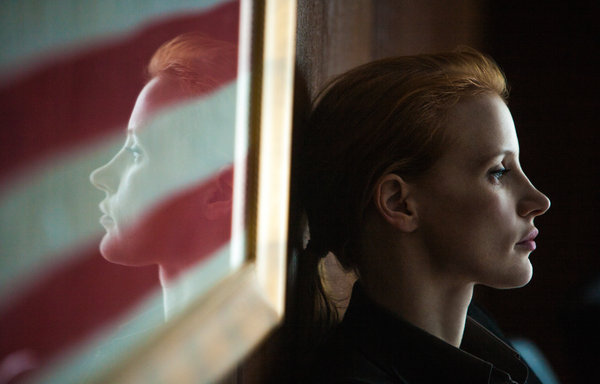 |
| Maya (Jessica Chastain) in Zero Dark Thirty |
Torture does not yield accurate information. Yet Dan repeatedly says to Ammar, “You lie, I hurt you.” When Ammar begs Maya for help, she tells him, “You can help yourself by telling the truth.” Not only does it subvert our gendered assumptions that she would be sympathetic to him. It puts the onus on the tortured detainees, not on the racist atrocities committed by government officials.
 |
| Admiral Bill McCraven (Christopher Stanley) and Maya (Jessica Chastain) in Zero Dark Thirty |
 |
| Maya (Jessica Chastain) in Zero Dark Thirty |
2013 Golden Globes Week: ‘The Newsroom’: Misogyny 2.0
 |
| I am a great man. |
“…We reached for the stars, and we acted like men. We aspired to intelligence; we didn’t belittle it; it didn’t make us feel inferior. We didn’t identify ourselves by who we voted for in the last election, and we didn’t scare so easy. And we were able to be all these things and do all these things because we were informed. By great men, men who were revered.” (emphasis added)
“A student asks what makes America the world’s greatest country, and Will dodges the question with glib answers. But the moderator keeps needling him until…snap.”
“IT’S NOT. BUT IT CAN BE.”
 |
| IT WAS HER IDEA! |
 |
|
MacKenzie frequently has emotional breakdowns in front of her staff.
|
 |
|
Maggie earned her position at News Night by being promoted accidentally before McHale promotes her for being “loyal.”
|
 |
| “Don’t worry. I got this.” |
“I think I would have done very well, as a writer, in the forties. I think the last time America was a great country was then, or not long after. It was before Vietnam, before Watergate.”
“No, it was you, Billy. I was just producing.”
It’s easy to laud the accomplishments of “great men” if you’re so sure that you are one yourself (Will McAvoy and Aaron Sorkin certainly do). And while the show features good acting and interesting critiques of media and almost-current events, it’s hard to fully appreciate all of that through the cloud of self-importance.
—–
2013 Golden Globes Week: The Evolution of ‘The Big Bang Theory’
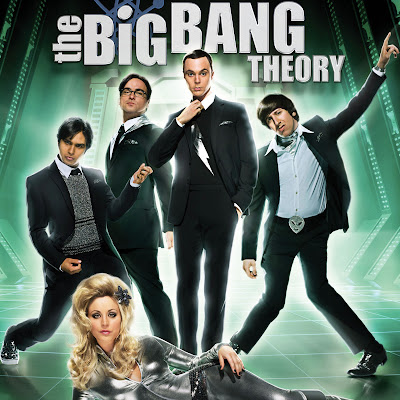 |
| Kunal Nayyar, Johnny Galecki, Jim Parsons, Simon Helberg, Kaley Cuoco |
Written by Rachel Redfern.
The Big Bang Theory, the show that legitimizes the nerd in all of us and tickles that small (or large) part of us that gets the Star Trek jokes. The writers of the show are like geeky unicorns who can finally tell that nerdy joke you’ve been trying for years and who make you smile with superiority when you manage to understand one of the many scientific concepts thrown around.
For the second time, The Big Bang Theory has been nominated for a Golden Globe award in Best Television Comedy Series. This is also the second Best Actor in a Television Series-Comedy or Musical nomination for Jim Parsons, the hilarious actor who plays Dr. Sheldon Cooper, an award that he won back in 2011. Similarly, Johnny Galecki was nominated for the same award in 2012.
Instead of just being another rendition of ‘Friends’ and ‘How I Met Your Mother,’ The Big Bang Theory has a unique foundation in its scientist main characters. The main characters Leonard Hofstadter (Johnny Galecki) and Sheldon Cooper (Jim Parsons) are brilliant, but struggle socially, embodying the traditional nerd stereotype in their love of science fiction shows, fantasy card games, comic book mania, and gamer lifestyle. In the typical sitcom, these kinds of characters are usually background extras that provide the comedic situation for a bad date; while definitely quirky, each of The Big Bang Theory characters’ intelligence and desperate need for affection provide the necessary comedic relief.
The show’s contrasting use of pop culture and advanced scientific concepts is engaging and is augmented by guest appearances from Star Trek alums LeVar Burton, Will Wheaton, and a voice-over by the unparalleled Leonard Nimoy, as well as scientific celebrities Stephen Hawking and Neil DeGrasse Tyson, to name a few.
However, despite the unique nature of the show and it’s legitimately hilarious dialogue there are problematic elements to The Big Bang Theory and it’s a problem I’ve mentioned before: the use of stereotypes. Stereotypes are obviously an important part of comedy; the stereotype is a relatable way to demonstrate a familiar funny situation (or an unfamiliar one since I know few people as smart and neurotic as Sheldon Cooper). However, the stereotypes used in The Big Bang Theory often pigeon-hole women who aren’t physically appealing into socially awkward nerds with latent lesbian tendencies and traditionally beautiful women into uneducated sluts with bad taste in men.
Kaley Cuoco plays Penny, the third main character on The Big Bang Theory, who is a beautiful, young waitress and a bit of an airhead. There are a few disturbing moments on the show when Penny is condescended to by the male characters and is given lines to reflect an “I’m hot but stupid” mentality. Now, this isn’t to say that there aren’t some people in the world who are probably like this, but perhaps it wouldn’t be so noticeable on The Big Bang Theory if it wasn’t used so often with it’s female characters.
 |
| Kunal Nayyar, Melissa Rauch, Simon Helberg, Jim Parsons, Mayim Bialik, Johnny Galecki, Kaley Cuoco |
In the first three seasons it’s especially noticeable as all of Penny’s beautiful friends are given similar characteristics, as are the beautiful women that the boys date. Even Bernadette (Melissa Rauch), Howard Wolowitz’s fiancé, who has a Ph.D in microbiology, is often typecast as an airhead who doesn’t understand a common sense principle as well as the boys.
Perhaps this is a good transition into the sexist mess that was the early Howard Wolowitz character. One of Sheldon and Leonard’s close friends, for the first four seasons Howard played the role of a disgusting, probably should be on a sex offender list somewhere, horny aerospace engineer. His goal was to get laid and so he lied to women, hired prostitutes, chased them down in a park, and was in general, completely repugnant for laughs. While the character has improved since the introduction of the Bernadette character and their marriage, for the first four seasons, Howard’s character ran rampant through the show, completely unchecked and without any repercussions for his behavior. If anything, there was a congratulatory sense to his actions, as if him hiring a prostitute and going back to his old ways of disrespecting women after a small breakup was something the audience should be sympathetic toward.
Howard’s character displays what I like to call the ‘Mad Men Principle:’ is a show sexist because it portrays sexist situations, or is it instead brilliantly self-aware and exposing sexism? In the case of Mad Men I would argue that yes, it is self-aware and exposing the massive amounts of sexism that was commonplace in the 1960’s. Does the same hold true for The Big Bang Theory?
I would say that in the early years of the show, no, it was sexist. For instance, take the episode “The Killer Robot Instability,” during this episode the sexually rapacious and unethical Howard Wolowitz says something incredibly inappropriate, wildly sexual and completely disrespectful to Penny for about the millionth time, yet when she tells him off, she’s the one who has to apologize for being rude. Despite the fact that Penny has now put up with Howard’s constant pick-up lines and overt sexual come-ons, when she finally stands up for herself and informs him that his behavior is inappropriate, she is the one in the wrong; this action validates Wolowitz’s inappropriate behavior and paves the way for him to continue being disgusting without consequences.
Or again, how Wolowitz treats his mother badly and demands that his girlfriend and wife cook and clean and care for him: the lovely Bernadette looks confused by his constant insistence that she do so, but continues to participate in his illusions about how she’s going to behave.
However, the show has gotten better the past few seasons; the characters feel more well-rounded, there are fewer jokes at Penny’s expense, and the “quick, try to bone every woman in sight” attitude from Wolowitz has subsided since his involvement with the Bernadette character. In fact, there was a moment of acknowledgment and apology for his past behavior in season five, an act of redemption that has put the show on the good side of the ‘Mad Men Principle’ for me.
 |
| Simon Helberg, Jim Parsons, Johnny Galecki, Kunal Nayyar |
In fact, the season four episode, “The Roommate Transmogrification,” started a clever role reversal featuring Wolowitz and Bernadette as she is offered a high-paying job at a pharmaceutical company. This job will make Bernadette the main ‘breadwinner’ in their relationship and spawns a situation where Bernadette treats him like a trophy wife. Similarly, in season five’s “The Shiny Trinket Maneuver,” Bernadette tells Wolowitz that she’s not sure she wants children, a problem that’s resolved by her compromise to have children if Wolowitz will stay home with them so she can continue her career. It’s obvious that this compromise is unacceptable to him, a fact that I appreciated since it was automatically assumed in the episode (as it so often is in life) that it’s the wife’s duty to give up her career and stay home with her children.
It seems glaringly obvious to make this point about a show who’s title references evolution, but the great evolution and development of The Big Bang Theory makes it, in my opinion, a well-thought out and intelligent sitcom. I’m hopeful that this deserving show will win a golden globe this year and that I’ll continue to laugh like the giant geek I am at every brilliant Star Trek joke that Sheldon Cooper makes.
Rachel Redfern has an MA in English literature, where she conducted research on modern American literature and film and its intersection, however she spends most of her time watching HBO shows, traveling, and blogging and reading about feminism.
2013 Golden Globes Week: Does ‘Argo’ Suffer from a Woman Problem and Iranian Stereotypes?
Written by Megan Kearns.
“I’m not saying they should create a new role for a woman or magically create a female spy (it’s not Alias, after all), but the women here deserve more than virtual silence. The film doesn’t take place at an all-boys’ school or a magical world in which all of the women have gone mute. It was the 1970’s, not Spike TV. There were women who had relationships to the story, and the film’s desire to marginalize them or cut them out completely shows how little modern Hollywood thinks of female narratives. Movies actually made in the 70’s had better roles for women than this, and the idea that Affleck gets let off the hook for sexism because he made a period piece is insulting…As a movie about movies, Argo wants to hold up a mirror to Hollywood and reflect the craziness of the industry, but in doing so, also perpetuates that industry’s rampant and systemic sexism.”
“But throughout the film, the Iran we see in the news clips and the Iran we see dramatized are all on the same superficial level: incomprehensible, out-of-control hordes with nary an individual or rational thought expressed…Argo glosses over the diversity of opinion in Iran and the intellectual ferment before the theocratic lockdown, making the culture look exactly the way an insular American public has come to believe all Islamic countries look.”
Interestingly, Ben Affleck told The Huffington Post’s Michael Hogan that the filmmakers changed the gender and nationality of the Taylor’s housekeeper:
“I changed it because I wanted to represent a Persian character that wasn’t a fanatic, that wasn’t railing against the United States, but that’s just somebody like all of us who’s trying to go to work and feed their family and do all the things they need to do, and who’s kind of buffeted by the political winds that are kicked up by others, particularly by others that are higher up than them.”
“But calling her the most important Iranian character is not saying much — and neither is Sahar. Over a handful of scenes she may have a grand total of 3 lines. In this case they are translated, because they are relevant to the plot. Her character, however, is defined by her attitude toward the Americans. She also may be the only kind of Iranian the movie is interested in individuating because she is separated from her society, ensconced in a Western household.”
Just like the other women in Argo, Sahar’s opinions and views are erased. Her importance truly lies in how she relates to men.
Argo shows how far we still have to go in gender equity in film. Sure, it’s a well-made movie. But that doesn’t inoculate it from sexism or racism. Awards indicate the art, culture and opinions we value. Just like somany Golden Globes and Oscar-nominated films, Argo revolves around men. Women deserve better. We’re not just satellites orbiting dudes.
‘The Hobbit’: A Totally Expected Bro-Fest
|
Written by Erin Fenner
|
| Is there enough dude on this poster for you? |
“All-male spaces and social circles existed in the kind of medieval settings Tolkien was commenting on, they exist today, and stories that are set in those environments aren’t uninteresting to me because I’m a woman — in fact, just the reverse. My hope isn’t that they go away, but that intellectually curious men should be able to find stories about femininity, and female spaces, whether they’re fantastical or not, just as fascinating, even if there aren’t male characters in the mix.”
Gender and Food Week: Scarlett Johansson Tired of Sexist Diet Questions
 |
| Robert Downey, Jr. and Scarlett Johansson at The Avengers press conference in London |
This post written by Megan Kearns originally appeared at Bitch Flicks on May 31, 2012. Cross-posted at Women and Hollywood.
Johansson has spoken in favor of feminism (yet doesn’t necessarily call herself a feminist) and female friendship, supports Planned Parenthood and condemns Hollywood’s ageism against women calling it “a very vain, vain industry.” So it’s no surprise she calls out this bullshit. I only wish more actors and members of the media would follow her lead.
In response to the asinine question, Sarah at Pop Cultured astutely asserts:
This constant bombardment of objectification of women leads to normalizing sexism and violence against women. It reinforces the notion that women are nothing more than sex objects for the male gaze.
So reporters, think twice before you ask a woman yet another stupid diet question. Ugh.
———-
Megan Kearns is a Bitch Flicks Editor and Staff Writer. She’s a feminist vegan blogger and freelance writer living in Boston. Megan blogs about gender, media, food and politics at The Opinioness of the World, a feminist vegan site she founded. She writes about gender, media and reproductive justice as a Regular Blogger at Fem2pt0. Megan’s work has also appeared at Arts & Opinion, Everyday Feminism, Feminist Magazine on KPFK radio, Feministing’s Community Blog, Italianieuropei, Open Letters Monthly, A Safe World for Women and Women and Hollywood. You can follow her on Twitter at @OpinionessWorld.
Bitch Flicks’ Weekly Picks
Amber‘s Picks:
Hollywood’s Year of Heroine Worship by A.O. Scott via The New York Times
Oscars and casting: Hollywood insiders discuss diversity by Solvej Schou via Entertainment Weekly
30 Lessons We Learned From Amy Poehler in 2012 by Krutika Mallikarjuna via Buzzfeed
Megan‘s Picks:
7 Ways Women and Girls are Sexualized, Stereotyped and Underrepresented On Screen by Dana Liebelson and Asawin Suebsaeng via Mother Jones
“There Is an Audience for Our Films”: Four African-American Female Filmmakers Speak Out by Lorenza Munoz via The Daily Beast
Surprise! Attempted Rape Scene in Episode of ‘The Walking Dead’ by Tizzy Giordano via Fem2pt0
TedX Women Talk about Online Harassment and Cyber Mobs by Anita Sarkeesian via Feminist Frequency
Is Historical Accuracy a Good Defense of Patriarchal Societies in Fantasy Fiction? by Dan Wohl via The Mary Sue
Google Grants $1.2M to Help Analyze Female Roles in TV, Film by Angela Watercutter via Wired
Hollywood’s Power 100 Mingle at THR’s Women in Entertainment Breakfast by Sophie A. Schillaci via The Hollywood Reporter
The Divine, Difficult Women of ‘Treme’ and David Simon’s Female Characters by Alyssa Rosenberg via ThinkProgress
Dreamworks Animation Is Proud of Having an 85% Female Group of Producers by Susana Polo via The Mary Sue
Sexist Quote of the Day by Bret Easton Ellis Melissa Silverstein via Women and Hollywood
What have you read (or written) this week that you’d like to share?
Guest Post: Movie Review: ‘Think Like a Man’
This guest post by Ela Eke-Egele previously appeared at Black Feminists and is cross-posted with permission.
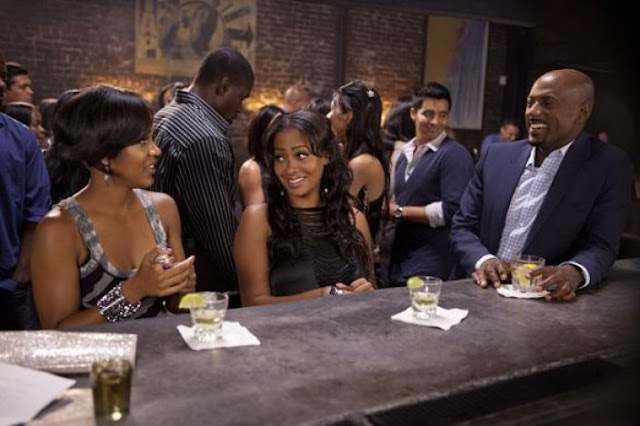 |
| L-R: Mya (Meagan Goode), Sonia (La La Anthony), Zeke (Romany Malco) in Think Like a Man |
Think Like a Man operates in a heterosexual world and works on the premise that women have an innate need for commitment while men are all about sex and that men are in a position of power today because sex and women have become too available. This is made clear at the onset, with James Brown’s It’s a Man’s World opening and a voiceover by Kevin Harris.
The impression that Think Like a Man gives is that a black woman’s primary focus is on finding and keeping a man and that we’re prepared to lie, cheat and manipulate in order to get one. But, I have to say, the men in this movie aren’t very appealing. They are sexist, emotionally immature with little potential for growth. The “Happily Married Man” is portrayed by a white man who in fact does seem more enlightened when it comes to relationships and more willing to compromise. But, I wonder what is this trying to tell us, that black men are not this sophisticated by nature and we just have to work with this?
Admittedly both the men and women in Think Like a Man are overplayed stereotypes. To suggest this is the best that men, particularly black men, have to offer is very bleak and to assume that black women are so desperate is insulting.
Think Like a Man roots for a playing field that favours men while it pretends to empower women. Conforming to some basic stereotypes and predefined rules makes women easier to understand and also removes the need for men to relate to us as individuals. Steve Harvey is unapologetic when he says that “we need to talk” are the four words most dreaded by men. This is following a scene where one of the men gets a call from his girlfriend who says exactly that. The scene also makes it plain that men have no such reservations when it comes to talking about strippers and ‘titties and ass.’
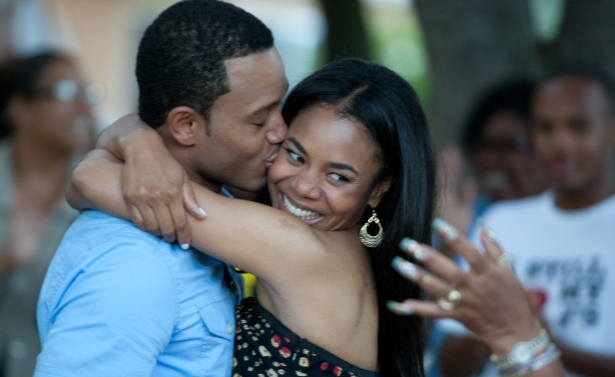 |
| L-R: Michael (Terrence Jenkins) and Candace (Regina Hall) in Think Like a Man |
The movie denies that men are intimidated by a woman’s success yet we are told that the male DNA is encoded with the need to be the provider and the compulsion to be in control. A view that conveniently ignores evolution and is so worn out that it is completely threadbare. Successful and accomplished women are accused of being too independent and giving off the impression that they do not need men because they are men. The preferable strategy for these women is to downplay their achievements, lower their standards and settle for less. So, this film doesn’t seem as much about helping women get men as it is about helping men get women with minimal effort and undamaged egos.
Think Like a Man is nostalgic for a time when men were men and abundant chest hair and gold medallions were a sign of virility, and I can’t help but feel that it may be a reflection of how hard it is for black men to deal with the much-improved status of women today. Women are more successful, financially secure, sexually liberated and independent than they have ever been and, perhaps for men like Steve Harvey, it makes it seem like male privilege is slipping away, so now there’s a war on.
Harvey’s book was on the New York bestsellers list so it obviously did well, but I think that any women who finds it necessary to resort to these tactics is simply encouraging bad behaviour and buying into the idea that black men are a lost cause. Steve Harvey, instead of looking to women for a solution, should encourage men to look to themselves. Men, even black men, need and benefit from commitment and any who refuse to adapt will lose out in the long run. Women deserve better. Perhaps he hasn’t realised this yet, which might explain why he is on his third marriage. This makes it even harder to take his book and this movie seriously.
Damning ‘Ted’ with Faint Praise
 |
| Mark Wahlberg and Mila Kunis in Ted. |
